Bluebird Predators
Discouraging predators and other nest box invaders
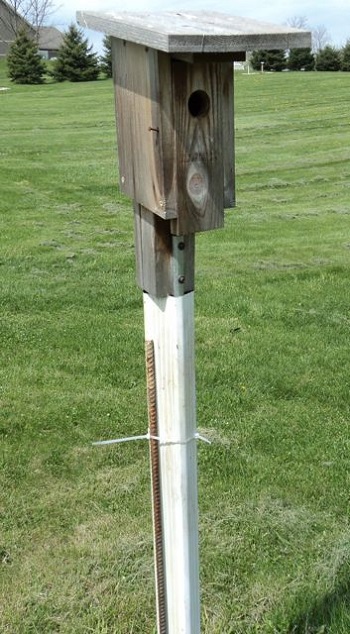
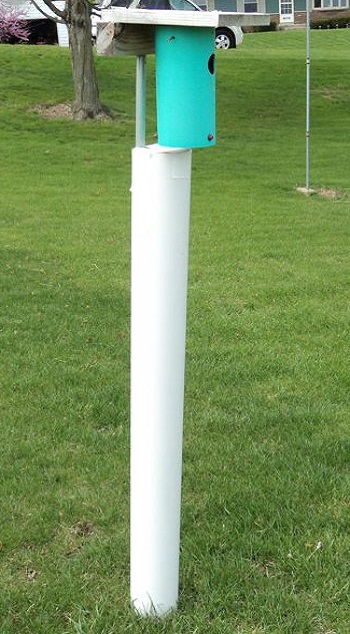 Raccoons and Red Squirrels
Raccoons and Red SquirrelsRaccoons present a danger to cavity nesting birds. They are intelligent and are good climbers; they can reach into a nest box hole and remove its contents. Red squirrels can enlarge the hole of the bluebird house and even take up residence if able to get inside. Metal inserts in the access hole will prevent squirrels from getting inside and prevent woodpeckers from enlarging the hole.
Predator guards attached to the post of the nest box will discourage predation by raccoons and squirrels. Pictured are several types of predator guards which have proven to be effective and described as follows:
1. get a predator guard from a local pet/hardware store or make one yourself.
2. Attach a length of 4" PVC pipe and to the post. Spray the PVC with a high gloss silicone to make the climb a slippery slope. You can also use any inexpensive liquid or paste car wax applied and buffed with a rag. Keep the rag in a baggy for future use. Waxing the pipe is important to protect against raccoons & other menaces!
3. Mount a 16" inverted planter on the pole below the box so that it swings freely. Paw prints from a raccoon were discovered on one planter, but the young bluebirds in the nest were fine. It appears that the raccoon tries to climb up the planter but fails. Drill a 3/4 " hole in the bottom of the planter and slip it over a 5/8" conduit. It is held in place with a washer with a 3/4" hole and a small hose clamp 5/16"-7/8" range. Adjust dimensions for larger or smaller diameter conduit.
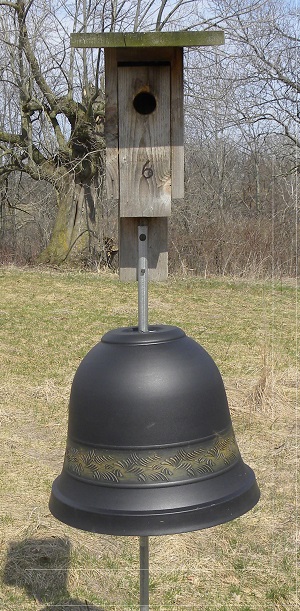
The House Sparrow
In southwest Wisconsin, we have several beautiful native sparrows. The House Sparrow does not belong to our list of native birds. It is a non-native species that was introduced to North America in 1850. Formerly known as the English Sparrow, this bird reproduced abundantly and, by 1903, it had spread throughout the United States. The House Sparrow is a very aggressive predator, killing female bluebirds on the nest by pecking their heads and killing the nestlings. The female House Sparrow lays 2-6 eggs starting in April and continues until late July with at least two nestings. One pair of House Sparrows producing 9 young in one season could result in an additional 59,000 House Sparrows over 5 years. Therefore, the permanent removal of one nesting sparrow will make a real impact on the population of this bluebird predator.
Options for dealing with House Sparrows:
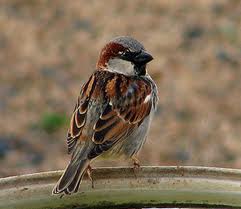 Remove boxes. If House Sparrows are allowed to reproduce freely on your bluebird trail, you would be better off to remove your boxes, since it is unlikely that bluebirds will not survive on your trail.
Remove boxes. If House Sparrows are allowed to reproduce freely on your bluebird trail, you would be better off to remove your boxes, since it is unlikely that bluebirds will not survive on your trail.
-Remove the House Sparrow nest and/or eggs. If a House Sparrow is allowed to build a nest and lay eggs, caution should be used in removing the nest if a bluebird is nesting in a box nearby. The House Sparrow, upon discovering that its nest is gone, may usurp the bluebirds nest and kill the parent bluebird. One strategy is to remove the sparrow's eggs and allow the female sparrow to continue to lay eggs in the box, but not allow them to hatch. At least, this keeps the sparrow population from increasing.
-Trap and kill the House Sparrow. Traps are available to capture House Sparrows. The Van Ert trap is one example that works well and is available at the Bluebird Nest Nature Center. The Gilbertson Universal Sparrow trap is another option.
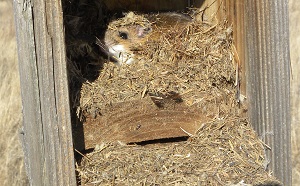 Field Mice
Field MiceA field mouse that has taken up residency in one of your bluebird houses can startle you when you open up the box so it is wise to open it slowly and cautiously. The mouse is found most often in the early spring after the box has been closed up for the winter. Their nest is typically composed of milkweed seed that looks like cotton. The mouse chews the milkweed to make it nice and fluffy.
Although the big eyed, little mouse looks cute, caution needs to be taken when cleaning out the nest. The mouse is known to carry the Hanti virus that can be deadly. Never allow the fecal matter to fly at you when cleaning the box, if inhaled the virus can get to your lungs.
To keep mice from building nests in your boxes over the winter, leave the door open. This will also keep squirrels and woodpeckers from enlarging the entrance hole.
Ants Fill a small bottle with powdered ant poison. To get rid of the ants, lift the nest with a paint scraper, spread the powder under the nest and that should take care of it. Ants can kill nestlings, so be sure to carry some ant poison with you.
Black Flies
2013 Protocol for Black Flies from BRAW website:
Black flies are a menace like no other to cavity nesting songbirds. In Wisconsin, blackflies are limited mainly to the southwestern, driftless areas of the state. The counties there have many slow-moving but low-pollution streams that are ideal for production of black flies. Female black flies are the real culprit of this insect. Like female mosquitoes, they are attracted by CO2 given off by incubating hens or immobile chicks and bite them for a blood meal. Females are driven off their eggs by the persistent biting of black flies but chicks can't get away from black flies and are killed by dozens of black fly bites. Anyone who finds a brood of chicks killed by black flies will not soon forget it.
But we now have a way to prevent black fly deaths. It's best to use Permethrin-10 poultry insecticide. Dilute it to 0.50% concentration and place it into an aspirator bottle such as a 'Windex Bottle'. When you find black flies around your nest box (swarms hover like a large fruit fly) use this protocol to prevent the hen from abandoning the nest box and the death of the chicks:
A) spray the opening and all cracks on the box, both inside and out
B) if there are eggs in the nest, put a small, clear jar over the eggs and spray the nest thoroughly.
C) if there are chicks in the nest, make sure they are at least 3 days of age; mist thoroughly (spray does not harm the eyes)
D) the 2nd week, spray the hole and cracks on the outside of the box only, again plus the nest if the eggs have not hatched and spray the chicks for the 2nd and final time.
If you recognize that black flies are being attracted to your boxes, you can almost eliminate blackfly problems entirely, if you use these techniques.
Marci Hess has this suggestion if black flies bother you when you monitor the trail: "I found peppermint oil did a good job. Has to be reapplied periodically though."

